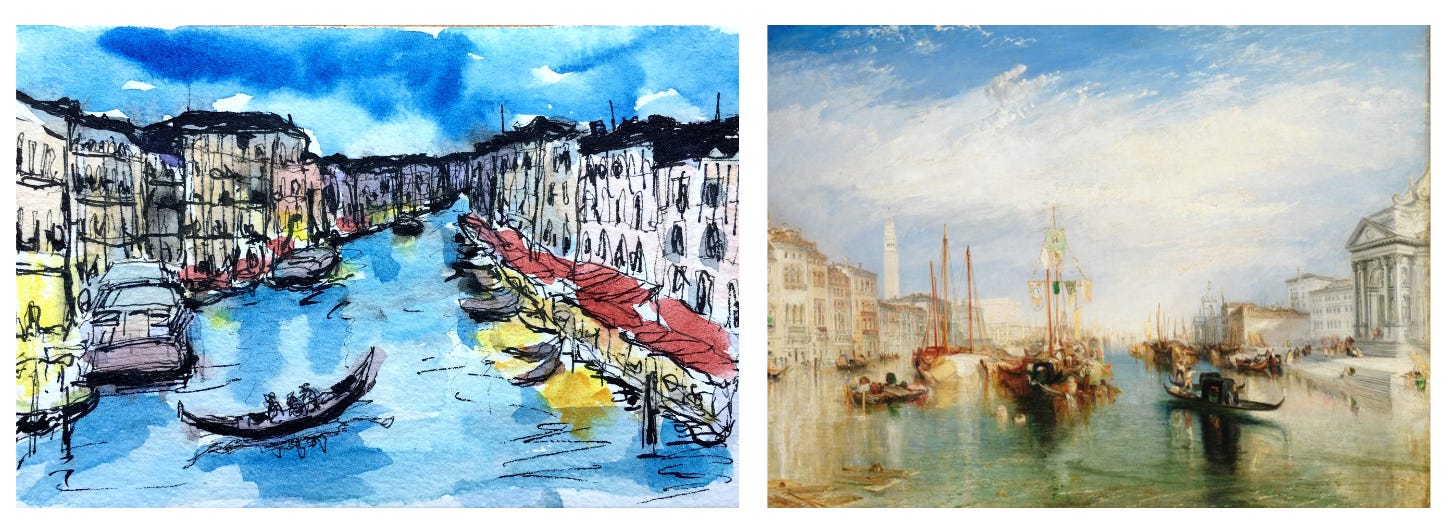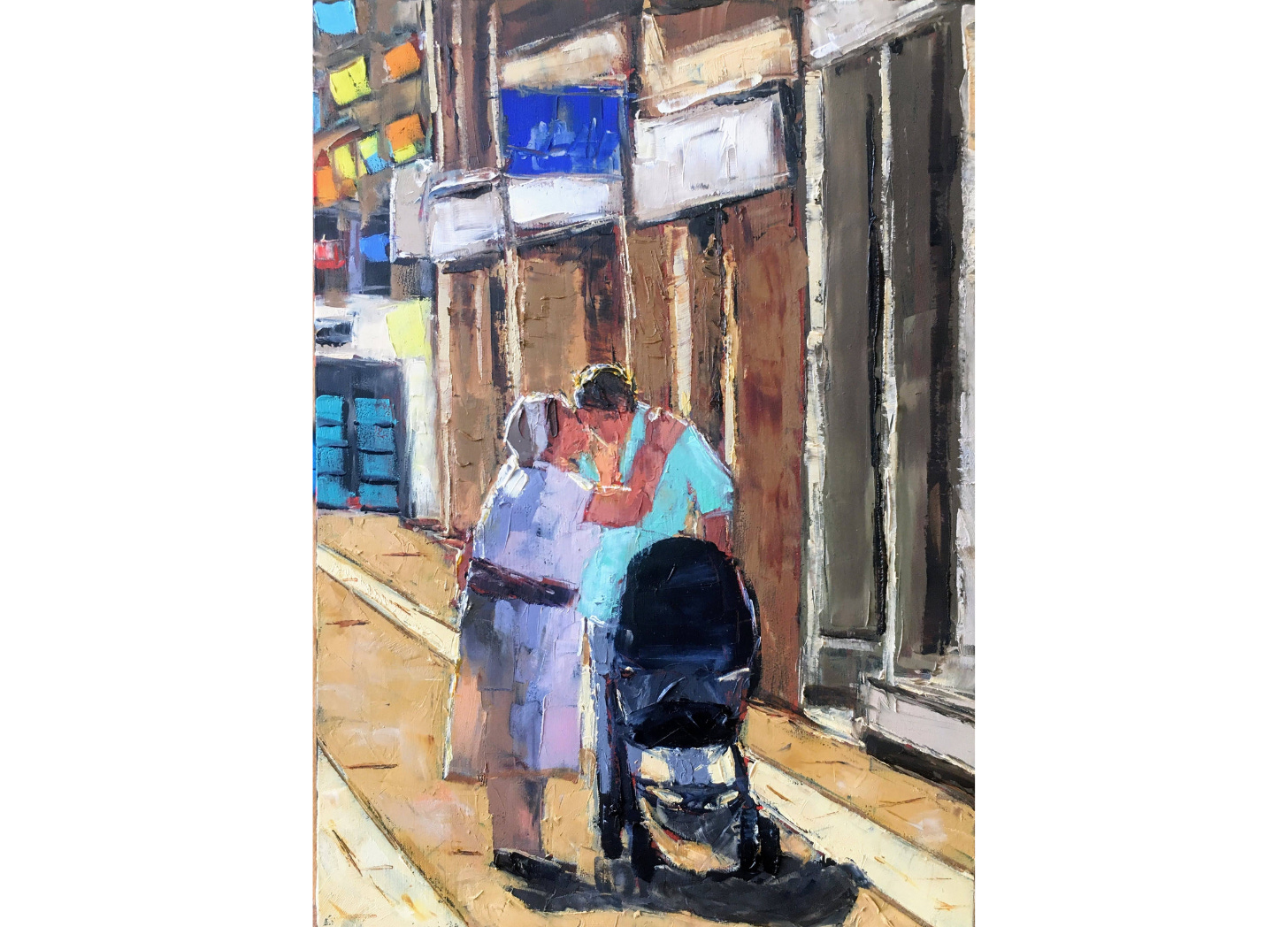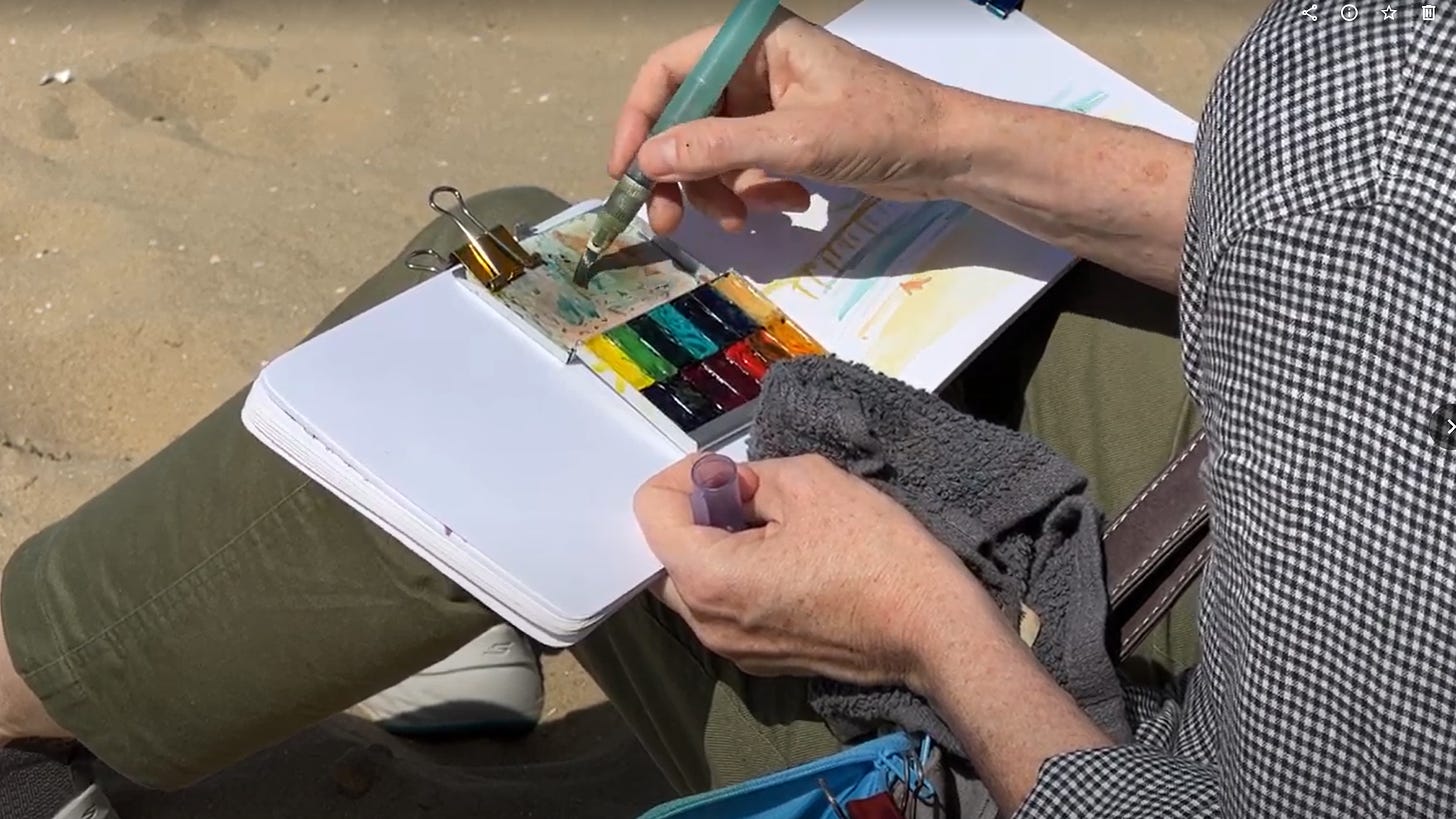Your art isn’t what’s frustrating you. It’s the comparison.

Over the last few weeks, a lot of people have reached out to me about this idea of the self-appointed artist residency. What I hear most from people is that they’d like to do it, but they aren’t an artist or their art just isn’t good enough. Last week, I wrote about the whole misguided idea of talent as an inborn trait and how I don’t buy into it.
This week I want to talk about why we get so unhappy and frustrated with our art. The other day I heard this expression: Comparison is the thief of joy1.
(Hearing this was immediately helpful to me for other reasons—I was in a very cranky mood, and frustrated because I was so cranky and just couldn’t snap out of it, and that of course made me even more cranky. But as soon as I heard that expression, I realized that I was comparing my present cranky state to other, happier states, and that’s what was making me so miserable, so I stopped doing that and felt better right away. Go figure.)
So here’s the thing about not feeling happy with the art you’re making right now: You’re probably comparing it to people who are in a different place with their art practice than you are. Maybe they’ve been at it longer. Maybe they devote more time to it. Whatever the reason, they are over there, and you are right here. You’re much better off comparing yourself to earlier versions of you.2
Here’s an earlier version of me
Here is a picture I drew when I was 30 and thinking about taking an art class. No sane person would look at this and claim that I had an ounce of talent for drawing. If you drew this, it would serve as proof to you that you had no talent and should not pursue art.
This is a real “don’t quit your day job” kind of drawing, isn’t it?
I didn’t quit my day job, but I did sign up for an art class. Starting in my thirties, I took art classes once a week, on Wednesday nights, except when I was out of town, which was often. The classes cost $25. Some weeks I practiced outside of class, and some weeks I didn’t.
Then I took some online classes that cost about $30 for several hours of instruction. I took those classes at home, in my spare time, whenever I could fit them in.
You probably have twenty-five bucks and a couple hours a week.
After about fifteen years of that, I drew this picture. I’m choosing this one because it’s as similar a subject to the lighthouse as I could find.
I’m awfully fond of that drawing, but we both know it’s no masterpiece. You would be forgiven for wondering why I hadn’t made more progress after 15 years! But it is an improvement, right? And it came about because I plugged away and took a lot of classes and made a lot of art.
As a perpetual student of art, I have enjoyed every step of the process, even the bad drawings and failed paintings—and there have been lots of those.
Another oft-repeated quote3: Every artist has a thousand bad paintings in them. You just have to get them all out. The good news is that they don’t come out in order. Some great paintings will pop out here and there along the way. Those are the ones that keep you going.
It’s not too late

Even knowing all of this, you might still be thinking it’s too late. Maybe you’re thinking: I’m sixty already. If I start now, and it takes me ten years to get really good, I’ll be seventy. But guess what? You’re going to be seventy anyway. (At least, I hope you will!) The only question is whether you’ll be a skilled artist at the age of seventy or not. Which would you prefer?
I thought so. Go ahead and start.
OK, sure, you might be saying. Maybe I can take a lesson. Maybe I can keep some art supplies sitting out and pick them up for thirty minutes here and there. Maybe anyone can be taught the technical skills. But there’s more to it than that. It’s not enough to know how to draw. You have to know WHAT to draw. Where to place it on the page. How to set the mood. That can’t be taught.
People have said that to me, and pointed to my drawings as evidence. You chose to draw that clock tower against the sky, they say. I would’ve walked by and never noticed it. That’s your talent.
OK, but guess what: All of that is teachable, too.
How to choose a subject is a topic in any drawing course, and, for that matter, in any writing course.
How to find a focal point is a topic, in both drawing and writing.
Composition—where to place the elements of your drawing so they are arranged pleasingly on the page—that’s a teachable topic (as is story structure, the literary version of composition).
How to convey mood through the use of perspective, close-ups, values (light and dark), and color—those are teachable topics.
But I just know I’ll never be any good, you’re now protesting, weakly.
Here’s a promise: You’ll be as good as the instruction you receive. You’ll be as good as the practice you put in. You’ll be as good as the curiosity and engagement you bring to it.
But—wait. You know what? It doesn’t matter how good you get.
All that matters is whether you enjoy it.
I can honestly say that this photo comes from one of the happiest moments in my life. I was on vacation in New Mexico with my BFF. I had a paintbrush in one hand and a can of Champagne in the other hand. The lid of the cooler was my easel. Who the hell knows how that painting turned out? Does it matter? No! I would go back and live that day over again in a heartbeat if I could.
When people stop to watch me draw, and say, “I wish I could do that,” the word that matters is DO. They don’t really want to have produced that particular drawing. What they really want is the pleasure of sitting under a tree with a watercolor set, creating some passable facsimile of the scene in front of them. It’s the activity that looks so pleasurable to people.
And anyone can learn to make a passable drawing of a landscape, and enjoy doing it.
Anyone can learn to play three chords on the guitar, which will allow you to play a recognizable version of almost every popular song written since 1950.
The question isn’t how good you’ll get. I’m willing to bet that your wish to paint, or draw, or write poetry, isn’t born out of a desire to make art that other people will universally regard as brilliant. You’re probably not longing to play the piano because you want to hear people applauding.
You probably just really want to do that thing, and to do it well enough that you don’t give up in frustration after five minutes. You want to be able to play a song all the way through to the end. You want to be able to fill a sketchbook with memories of your trip. You want to write a story about that thing that happened to you.
And you can do that, with some practice and some training.
I’ll leave you with this interview snippet from Ira Glass4. I’m sure some of you have heard it, but for those of you who haven’t—some final thoughts about being a beginner.
Supporters are getting something artsy this week
I’m in Europe right now, and I have every intention of drawing something and filming it and sending it out to those of you who support this little enterprise. Will I actually pull this off? You’ll have to subscribe to find out!
Anyway, if there’s something you’d like to do in a sketchbook, we’re probably doing it. These video lessons go out once a week, and you get access to a whole archive right here. Join us!
The Bit at the End
Order signed copies of my new book, The Tree Collectors, from Broadway Books here in Portland.
Come find me on Instagram, or see paintings for sale- Right here
Order signed copies of some of my books from my husband’s bookstore, or order my books and many books I love at Bookshop.org
Take one of my online writing or art classes here
Leave a comment! I love hearing from you!
I wish I could give credit for this quote. It appears to have turned up in a few obscure books, one on disability and a couple on religion, starting about twenty years ago. It is not, apparently, attributable to Teddy Roosevelt, C.S. Lewis, Mark Twain, or any number of other oft-quoted and oft-misattributed famous people. However, there are many more easily verified variations of this line going back a century or more, in which something (work, money, etc) is the thief of joy.
I am not the first person to say this, either. If I could figure out who said it first, I’d give them credit. There’s plenty of oft-repeated advice in this newsletter, but what can I say, it’s oft-repeated for a reason, and it’s been helpful to me so maybe it’s helpful to you.
I did spend way too much time trying to track down the author of this one. It could be Disney animator Walt Stanchfield, talking about 10,000 bad drawings, or it could be animator and cartoonist Chuck Jones. Or someone else entirely.
At least we know who said this one.








❤️ Needed to see this today, Amy! Awesome post - thank you. xxx
Such a great post, it's one I had on my radar. I'll just reference you again, if thats OK..... fantastic advice 👏